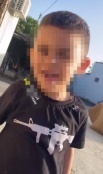On 5 June 2022, at around 10:30 am, Anwar Bilal Mustafa Qabha, 26 years old and her three-year-old son, Yusef Sanad Qabha, were crossing through militarised Gate 300, in the village of Toura, southwest Jenin on their way to the family home in the nearby village of Um al-Rayhan.
Um Rayhan, on the north-western side of the village of Toura, has been isolated behind the Israeli Annexation Wall since mid-2003, and the wall in this area is comprised of electronic barbed wire. Israeli Occupying Forces (IOF) man the iron gate known as Gate 300, and residents are required to obtain an Israeli permit to pass through the iron gate, which fragments the territory and separates the Palestinian villages. The IOF carry out daily inspections and security checks on the local residents as they pass through, requiring civilians to enter into an inspection room, and produce their identity cards and pass permits for the gate, for inspection.
That day, three-year-old, Youssef Sanad Qabha, was accompanying his mother and wearing a black monochrome children’s t-shirt with a white outline graphic imprint of a rifle. At the entrance of the inspection room, one of the Israeli soldiers began to scream repeatedly in heavy Arabic, “The boy is returning”.
Surprised by the screaming, the child’s mother, Anwar Qabha, asked the soldier the reason for her screaming, and the reason for preventing his child from entering the inspection room with him. The female soldier responded saying that the child was wearing a T-shirt that is “forbidden to wear”, and ordered Anwar Qabha to remove the child’s t-shirt. Worried that the situation was escalating and to prevent further harassment that might end up preventing their access through the checkpoint, Qabha relented, and removed her son’s t-shirt.
All the while, the young child, remained without his upper body clothed, in full sight of the soldiers. After the security check in the inspection room, the mother and son, the latter still disrobed, were allowed to pass through the Annexation Wall at Gate 300, while an Israeli soldier who was perched inside a military watchtower tower attached to the gate aimed his weapon at the mother and child. At the gate, the IOF forced Qabha to throw her child’s t-shirt on the ground in front of the inspection room.
Anwar Qabha recalled to Al-Haq:
“I felt a great danger to my life and the life of my three-year-old son, who was stunned by the soldiers’ behaviour and cried as I forced him to take off the T-shirt and keep him without top clothes. When I arrived at my family’s home in Umm al-Rehan, my son was still suffering and crying loudly”.
Al-Haq warns that Israel, the Occupying Power has very strict obligations pertaining to the administration of civilians in the occupied territory, in particular, children.[1] The most basic customary norms of the Hague Regulations require that the Occupying Power respect “family honour and rights” and “lives of persons”. While the supplementary provisions of the Geneva Conventions provide that “protected persons are are entitled, in all circumstances, to respect for their persons, their honour, their family rights, their religious convictions and practices, and their manners and customs. They shall at all times be humanely treated, and shall be protected especially against all acts of violence or threats thereof and against insults and public curiosity”.
Similarly, the provisions of the Convention on the Rights of the Child, binding on Israel as a State Party, provide under Article 37(a) that “No child shall be subjected to torture or other cruel, inhuman or degrading treatment or punishment”. Al-Haq reminds that the Concluding Observations of the UN Committee on the Rights of the Child have previously and emphatically condemned Israel for its treatment of Palestinian children under similar instances of interrogation and detention: “The Committee is concerned at allegations of torture and other cruel, inhuman or degrading treatment or punishment of persons deprived of liberty, including minors. According to these allegations, torture and ill-treatment are mostly perpetrated by law enforcement and security officials, mainly from the Israel Security Agency, the police and the Israeli Defence Forces, particularly during arrest, transfer and interrogation.”[2]
Further, Al-Haq highlights that the inhumane act carried out by the IOF against the three-year-old, Youssef Sanad Qabha, results from Israel’s policies and practices of apartheid.[3] Al-Haq warns that the inhumane act has been carried out in the context of an institutionalized regime of systematic oppression and domination maintained by Israeli-Jews over Palestinians, in a discriminatory and segregationist regime of territorial partition. Under international law, such inhumane acts amount to the crime of apartheid, a crime against humanity under the Rome Statute of the International Criminal Court.[4] Such acts are further evidenced by the Annexation Wall, inspections and security checks, and a persecutory administrative regime of identity cards and gate pass permits.
[1] Article 50, Fourth Geneva Convention (1949)
[2] UN Committee Against Torture (CAT), Concluding observations on the fifth periodic report of Israel, 3 June 2016, CAT/C/ISR/CO/5, para. 30.
[3] Article 1, Apartheid Convention (1976).
[4] Article 2(a)(ii), 2(d), Apartheid Convention (1976); Article 7(2)(h), Rome Statute of International Criminal Court (2002).


